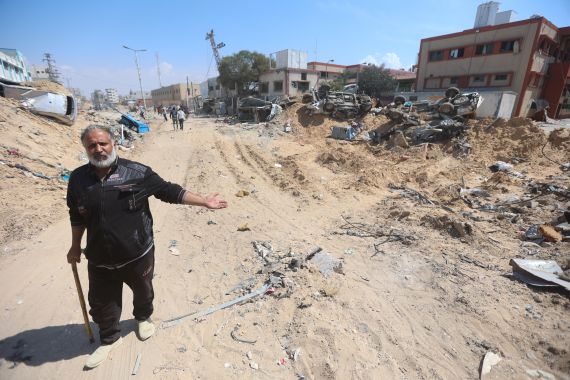Gaza and the Values with Variable Geometry

This year marks the thirtieth anniversary of the genocide of the Tutsis in Rwanda. In 1994, within a three-month period, between 800,000 and one million people were massacred in the face of the indifference of the international community. Thousands of pages of reports, books and court rulings provide detailed information on the planning and execution of a mass crime in the 20th century. While the memory of the tragedy in Rwanda is still fresh in everyone’s mind, we are at the same time watching helplessly as horror unfolds in Gaza, where the International Court of Justice, in its ruling of 26 January, affirms that there is a serious risk of genocide.
If nothing is done, the tragedy could be repeated, and no one will be able to say they didn’t know, because we all have the means to see what is tragic. History is reminding us and forcing those in a position to act to do so, so that the unbearable things that are happening can be brought to an end.
Read the column – The Savana Conclave
Every generation that has lived through the horror of conflict and mass crime proclaims: “Never again.” After the Great War and the establishment of the League of Nations, humanity thought it had put in place a body to prevent major atrocities. The LoN was unable to prevent the outbreak of the Second World War. So, the UN was born with the aim of guaranteeing international peace and security. So far, it has succeeded in preventing a third world conflict. It has set up mechanisms whose effectiveness can be applauded at specific times. But the UN, a giant for small nations, is so weak in the face of the powers that hold the main levers, in particular those that sit as permanent members of the Security Council with the right of veto. No state or international organisation was able to prevent the genocide in Rwanda in 1994. Dutch peacekeepers were unable to prevent the ethnic cleansing of 8,000 Muslims in five days in the Bosnian enclave of Srebrenica in 1995.
Since 7 October and the Hamas attack on Israel, the disproportionate response of the Hebrew State has taken on the appearance of a desire to wipe the people of Gaza off the world map. After sixteen years of an inhumane blockade, condemned several times by international courts, Israel is committing crimes against a civilian population that has already paid a heavy price for the occupation, under the pretext of self-defence.
Read the column – Facing Up
The Gaza Strip, bombarded daily by one of the world’s most powerful armies, has become a field of ruins. The figures show the scale of the tragedy. Before the massacres, Gaza had a population of 2.2 million. The median age is 18, and 80% of the inhabitants live on international food aid. In six months of bombing and ground occupation on the pretext of wiping out the Hamas militiamen, some 33,000 people have been killed, the majority of them women and children. 13,800 children have died in Gaza, more than the average number of children who have died in four years of conflict worldwide. 1.7 million Palestinians have been displaced since the start of the conflict. Last week, the US Secretary of State announced that 100% of the population of Gaza was in a situation of serious food insecurity.
For months, the extreme right-wing Israeli government has been killing and forcibly displacing people, with the unquestioned support of the major powers: the United States, its traditional ally, and France, Germany and Great Britain first and foremost. The Spanish government’s courage and humanism set it apart from its European allies.
Faced with the scale of the massacres, the macabre toll that continues to rise, and the emotion expressed by public opinion, positions that were once frozen have begun to shift around the world, albeit in the face of constant memorial blackmail by the Israeli government and brutality in words and deeds.
Read the column – This 24 March, democracy will dictate its law
In the wake of an international public outraged by the images of this ‘war’ without images, because one of the belligerents, Israel, is preventing journalists from gaining access to Gaza to report on what is happening there, voices that were once aligned with Netanyahu’s position are increasingly being raised. François Hollande spat out: « Enough! This is no longer bearable or acceptable » and other leaders are timidly expressing their disgust. The episode of « unconditional » support the day after 7 October has served as a horror bonus for the extremists in power in Tel Aviv.
Weapons are crackling in Gaza, where a military power is razing an entire region to the ground in defiance of the world that calls itself « civilised ». On another hotbed of tension, Ukraine, the reactions of this same « civilised » world are radically different. The famous Western double standard, expressed with flagrant indecency.
Read the column – In the Soft Tropical Dictatorship of Senegal
Voices are being raised in Africa and elsewhere about the symbolism of these events. The Russian leaders who invaded Ukraine are being punished; the country has been ostracized by the international community. There is even a debate about whether Russia should be allowed to take part in the next Olympic Games in Paris. To justify this risky support trip, a French MEP, recently on a train between Poland and Ukraine, had this to say: “The Ukrainians are fighting for our values.” I wonder what values the Palestinians are fighting for?
By Hamidou ANNE / hamidou.anne@lequotidien.sn

